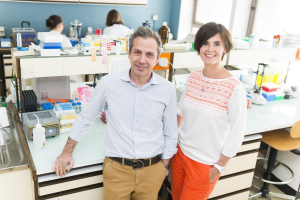Major advance in research regarding lobular breast cancer
Press release (01/03/2016)
A better molecular characterisation of lobular breast cancers to optimise patient care
Brussels, 1 March 2016 - Researchers1 at the Jules Bordet Institute have published, this 29 February in the Journal of Clinical Oncology, the promising results of a four-year study on lobular breast cancers, a form that accounts for between 10% and 15% of all breast cancers. This study suggests that lobular cancers could benefit from a different therapeutic approach to that adopted for other types of breast cancer. At present they are treated in the same way.

© Benoit Deprez - The Image Factory
Lobular breast cancer, a poorly-studied cancer that nevertheless accounts for between
10% and 15% of all breast cancers.
There are several different types of breast cancer at the histological level. These subtypes are defined by the
pathologist when he examines the tumour through the microscope. Lobular breast cancer is the second most frequent histological subtype after ductal cancer. Lobular cancers are known to have a different clinical
behaviour. They tend to recur later than ductal cancers and preferentially in other organs. To date, most research has concentrated on ductal cancers. This is why lobular cancers continue to be treated in
the same way as other types of breast cancer.
The study permitted a better molecular characterisation of lobular breast cancers
Researchers at the Jules Bordet Institute conducted research on the largest number of lobular breast
cancers studied to date, totalling 600 patients from the Institut Jules Bordet, the Université
Catholique de Louvain and two centres in Milan and Marseilles.
Carried out in cooperation with the Wellcome Trust Sanger Institute in Cambridge, Milan University
and Institute of Cancer, and the KU Leuven, the study made it possible to identify the various
mutations of the genes specific to lobular cancers by using new DNA sequencing technologies. The
identification of these genomic anomalies enriched in lobular cancer could improve the therapeutic
care of patients.
What are the potential clinical implications of the trial?
At present, the choice of treatment for a breast cancer is based on the tumour characteristics and
notably the oestrogen receptor and HER2 status. In particular, patients whose tumours express the
oestrogen receptor will, in general, be treated with hormone therapy. When the tumours
overexpress HER2, patients will receive a treatment specifically targeting this protein (Herceptin). On
one hand, this study showed the presence of changes to the oestrogen receptor gene or to genes
involved in its regulation, that were frequent than in ductal breast cancers. It is possible that the
presence of these mutations could be linked to a response or resistance to the various hormone
therapies and could influence the choice of hormone therapy. This will be tested in the near future in
the context of clinical trials. Also, this study identified more frequent mutations in HER2 and HER3
genes in the case of lobular cancers. Our researchers observed that the presence of changes in the
HER2 genes was associated with a high risk of recurrence in the short term. Patients whose tumours
show mutations in the HER2 and HER3 genes could benefit from specific treatments that already
exist. The results of this study show that a better molecular characterization of lobular breast cancers
could have major implications for the personalization of the therapeutic care of patients.
The study was financed principally by Susan G. Komen, the Friends of the Bordet Institute,
the National Fund for Scientific Research (FNRS), the MEDIC Foundation and the Breast
Cancer Research Foundation (BCRF).
Attached : Photo of Dr Sotiriou and Christine Desmedt
(1) Christos Sotiriou, MD, PhD, Maître de Recherche FNRS, Directeur du BCTL (Laboratoire de recherche translationnelle en cancérologie mammaire à l’Institut Jules Bordet) et Christine Desmedt, PhD, Bio-Ingénieur et chercheuse au BCTL
Press Contacts - Institut Jules Bordet
Ariane van de Werve
Institut Jules Bordet
Rue Héger-Bordet, 1,
1000 Brussels
Belgium
Tel : +32 2 541 31 39
GSM : +32 486 17 33 26
Email : ariane.vandewerve@bordet.be
www.bordet.be
To download
- Une meilleure caractérisation moléculaire des cancers du sein lobulaires pour optimiser la prise en charge des patientes266.17 KB
- lobulaire borstkanker_nl.pdf271.14 KB
- Major advance in research regarding lobular breast cancer.pdf258.13 KB
- Picture of Christos Sotiriou and Christine Desmedt - 2000HD.jpg386.67 KB